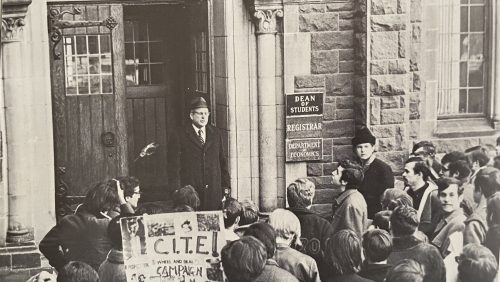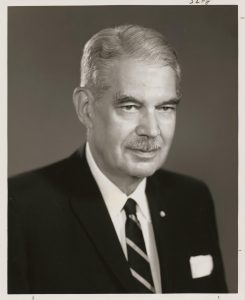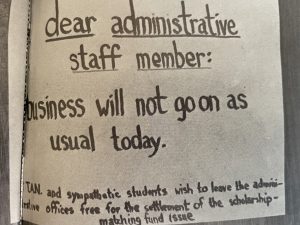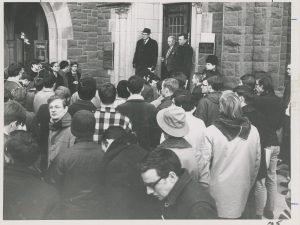The Sit-in and its Aftermath
Originally published in Trinity College in the Twentieth Century and The Trinity Tripod

The Sit-in and its Aftermath
In spring 1968, “mounting dissatisfaction with ineffective communication on a wide range of decisions affecting students and a heightened sense of dismay at the state of racial relations in the country brought on by the assassination of the Rev. Dr. King, combined to create a highly volatile situation on the Trinity campus.
In an action unprecedented in the College’s history, 168 students occupied the Downes and Williams administration buildings in an effort to force the trustees to consider the Senate’s proposal concerning scholarships for black students. ” — Excerpted from Peter J. Knapp’s Trinity College in the Twentieth Century
The following four articles and editorial published by The Trinity Tripod covered the events.
Students Obstruct Trustees, President
The Trinity Tripod, April 23, 1968

Demanding immediate consideration of the Senate-proposed Negro Scholarship program, some 150 students blocked the corridors of Williams Memorial outside the Trustee Room Monday afternoon at 5 p.m.
The situation reached an early impass when, in spite of requests from President of the College Albert C. Jacobs and Director of College Security Alfred Garofolo, the students refused to allow Trustee William Persons Gwinn to leave the building
Shortly after Gwinn’s request was denied, Jacobs came out of the room and told the students that the Trustees had been giving “very favorable consideration” to the proposal but that now they refused to consider it further. Jacobs asserted that the group would not work on the proposal under pressure.
The proposal in question called for the release of $50 from each student’s $150 general fee to be put into a scholarship fund for Negroes. It was passed unanimously by the Senate and approved by the student body at an all-College meeting April 8.
At 7:30 p.m. last night neither the students nor the Trustees had compromised their positions. The organizers of the sit in, members of the Trinity Association of Negroes, told the students to be prepared for at least an all night vigil.
It is known by the TRIPOD that Jacobs and other administrators were aware of the sit-in as early as 7 a.m. Monday morning. It was revealed by Dean of Students Roy Heath that members of Ms office and students co-operated during the day to help Jacobs draw up a statement to be read to the demonstrators after the meeting.
Heath refused to reveal the content of the statement to TRIPOD reporters last night at 6 p.m. He indicated, however, that the contests of it would have been favorably received by the students.
Informed sources told the TRIPOD yesterday afternoon that the Trustees would be allowed to leave “after a while.” According to these sources they would not be detained after 9 p.m. Plans to allow President Jacobs to leave before the Trustees were also revealed to the TRIPOD.
TAN member Robert Washington ’69 termed Jacobs’ announcement “backlash.” Jacobs denied Washington’s accusation saying, “I didn’t call it that.” Jacobs also denied a request from SDS President Stephen H, Keeney “71 that the Trustees immediately resume consideration of the proposal.
At 5:55 Jacobs came out of the room and requested that his personal secretary be allowed to leave the building. The request was granted by TAN. member Michael Williams ’18 who then entered the room to inform the Trustees that they were “not being threatened.” Trustee A. Henry Moses, replied to Williams that the Trustees felt that they were being threatened and that they considered the proposal to be very important.
Trustees Agree To Scholarship Plan; Demonstrators End Williams Occupation
The Trinity Tripod, April 24, 1968
Pledging to provide adequate financial aid for “as many qualified Negro students as are available” with a minimum guarantee of 15 full scholarships each year, representatives of the Board of Trustees reached an agreement with student negotiators shortly after midnight Tuesday that brought an end to the 31-hour student seizure of the Williams Memorial Administration Building.
The representatives of the Executive Council of the Trustees, Dean of the College Harold L. Dorwart, Chaplain Alan C. Tull, and College Counselor George Higgins met with the’student negotiating committee for the sitin during two two-and-one-halfhour sessions Tuesday afternoon and evening.
The College’s guarantee of a minimum 15 scholarships represents a yearly expenditure of approximately $200,000. The College is presently devoting over $75,000 a year to scholarships for disadvantaged students. The Trustees also made a direct financial commitment to match the Senate’s pledge of $15,000 to the project.
Members of the student negotiating committee reported to their constituents in the administration building that the Trustees preferred an ” open ended” commitment to provide scholarships for however many Negroes gained admittance over the Senate-requested financial commitment of $60,000 from the general fee.
The negotiators reported that the Trustees planned to raise the money by appealing for donations. If the income from donations in a given year were to fall short of the amount needed for the number of disadvantaged students admitted; the Trustees would make up the difference from the College budget, the students reported.
The final settlement was an amended version of a proposal submitted to the students by the Trustee representatives at a meeting in Chaplain Tull’s office at 2:30 p.m. That meeting was adjourned at 5 p.m. until 9:30 the same evening. During the interim the Trustee’s proposal was discussed by the students in Williams Memorial and amended to include the guaranteed 15 full scholarships per year.
Michael A. Williams ’68, one of the student negotiators, explained that the guarantee to provide at least 15 scholarships in no way compromises the integrity of College admissions policy. The 15 scholarships are conditional upon the acceptance of that number of qualified students by the admissions office, according to Williams.
In the statement announcing the student-Trustee accord, which was read to the press by Tull shortly after midnight, it was revealed that the College had begun “significant steps to meet the problems of race and poverty … before the receipt of the Senate requests.” The report continued to say that “the negotiations taken to complete these processes, unfortunately, at this time, may not be carried out publicly.”
When asked if he was satisfied with the agreement, student negotiator Steven Keeney ’71 replied: “Yes, the College has met our demands.” Keeney went on to say that he believed the requests of the original Senate proposal to be reflected in the 15 scholarship guarantee, Keeney suggested that the “open end” clause of the Trustee offer, pledging to aid however many dis- -,. advantaged students may be admitted, offered an opportunity to carry the program beyond the original Senate goals.
Both Dorwart and Tull denied that the College had “lost face’ in its confrontation with the students. Tull said that to talk in terms of “concession” was to carry the struggle beyond what “happily has ended.” He added that neither students nor administrators had any way of knowing what kind of consideration the Trustees would have given the proposal were it not for the sit-in.
Editorial: A Time for Thought
The Trinity Tripod, April 24, 1968
Fortunately, the events of Monday and Tuesday came to a satisfactory conclusion. The Executive Committee of the Trustees offered a proposal which binds the College irrevocably to the cause of civil rights and equal opportunities for the oppressed of this nation.
The sit-in has come to an end, but the College has not passed through the crisis. Before us lies the arduous path of reconciliation. We must emerge from the last two days as a united community–one dedicated to a spirit of progress that would make sit-ins and strikes unnecessary.
It is inevitable that when an issue is of great importance, emotions swell and attitudes tend to polarize. People are either strongly for or strongly against what is happening, and no one has the time or inclination to sympathize ‘ with opinions that conflict with his own.
Crisis did not bring out the best in Trinity gentlemen, nor did it enhance the stature of those who educate them. The pace of events caused confusion and has left a residue of bitterness which threatens to poison the atmosphere of the campus.
Though it may take some time until everyone can look each other in the eyes again, it is the duty of every member of the College to work for a reconciliation. It would be tragic for the Trustees, Administration, and Faculty to assume a “get tough” attitude in a vainglorious assertion of authority. Students are dedicated to further progress and we hope that the Administration will prevent a breakdown in sympathetic communications.
The TRIPOD urges the student body to give careful thought to their policies, and to discard the use of “crisis-diplomacy” as a viable political method.
Finally, we request that the 3-3 committee, in a spirit of goodwill, take no punitive measures against the six students involved in the sit-in. Unnecessary reprisals would hardly herald a promising future for the College.
160 Indicted for Trustee Blockade; 3-3 Committee Conducts Hearings
The Trinity Tripod, April 30, 1968
Responding to a recommendation of the eight-man indictment panel, composed of Dean of Students Roy Heath and the Medusa, President Albert C. Jacobs amended last week his original charges against the Williams Occupation demonstrators.
The Medusa-Faculty 3-3 Disciplinary Committee is now holding individual hearings on the charge of responsibility of restricting the right of access and exit to eight Trustees and two administrators on April 22. The most important alteration was not the deletion of the charge of false imprisonment, but the shift of blame from six alleged leaders to all students who hold themselves responsible for the demonstrative action.
Over 160 students were indicted last Thursday by the panel, which actually consisted of only two members resulting from the self-disqualification of Heath and five Medusa who participated in and sympathized with the Trustee blockade.
Names of the indicted were found on a petition signed Monday night by demonstrators who felt that “the sit-in group should assume a collective responsibility for the action, rather than permit only six men to bear the punitive burden.
Jacobs, after directing Heath to press the new charge, instructed the Dean to conduct the proceedings through the established judiciary channels. This procedure included indictment by the panel and a final judgment by the 3-3 Committee, which determines its own procedure. The sole inherent characteristic of the Committee is that Its decision must be unanimous.
There is no guarantee of the integrity of the Committee’s decision, though, since the Trustees still remain as the supreme governing body of the College. However, since Jacobs did pledge the employment of standard procedure, it is doubtful that a reversal of the Committee’s ruling will occur. In reaction to the indictment the students involved organized a Thursday night meeting which proved ineffective.
The gathering deteriorated into a three-hour debate on whether the indicted should act as a group or individually, on whether the charge was valid, and on how the meeting should be run. James Kaplan ’68, who was asked to assume chairmanship of the meeting, commented that it would be premature to predict the future course of the group’s action.
The membership of the 3-3 Committee includes Professor of Religion Theodore Mauch, chairman, Assistant Professor of Mathematics Don Mattson, Assistant Professor of History H.McKim Steele, and Medusa Sam Elkin ’68, Daniel Goldberg’68, and Malcolm Hayward ’68, who had disqualified himself from voting.
Steele explained that the institution of individual hearings revolved around the committee’s hope to get at “individual motives and individual understanding.” There is no demand for those indicted to appear, he continued, and anyone may bring relevant witnesses to the hearing.
Steele was unsure of how long the hearings, which will continue on a sign-up basis will last.
The individualized procedure of the Committee may indicate that the group expects to issue sentences and penalties varying in magnitude. Punishments can range from fines to expulsion.
Negro Scholarship Donations Sought
The Trinity Tripod, May 7, 1968
The Senate passed unanimously Sunday night a proposal enabling students to contribute “from their own resources” toward the Negro scholarship fund. The motion was introduced by Ralph G. White ’68.
The motion asks that “the present student body of Trinity College raise as much as possible of the initial commitment of $15,000 by contributing from their own resources.”
White kicked off the campaign with a personal pledge of $150, payable immediately. The Senate will now call on all students to contribute whatever they can, either in cash or In pledges from summer earnings, to reach the $15,000 commitment.
White’s motion provides the Senate with a second method of minimizing the cuts in student activities that will be necessary to support the scholarships. The Senate also plans to conduct a “work day” next year, the proceeds from which will go toward meeting the commitment. The Senate remains committed to make up the difference between the money raised through the work day and through student donations and the $15,000 it initially pledged.
White recognized the Senate’s commitment as answering the need for a “constant, predictable source of income.” He said,” however, that this procedure minimizes opportunities for individual participation.
White asserted that, if the students felt that their obligation was met by voting to release half the Senate budget, the program would be “less than a success.” His motion, he believes, will give students the opportunity to make individual contributions to the solution of the problems of race and poverty.
The plan also removes the basis for criticism of the Senate motion as a mere allocation of money which, in many cases, comes from the parents of students. White suggests that students pledge portions of earnings they are expecting from jobs this summer.

